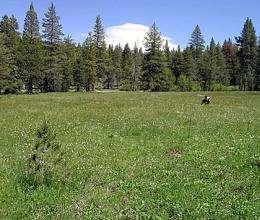New plant ecology study challenges conventional wisdom

(PhysOrg.com) -- An international team of 58 ecologists, including UC Davis researcher Louie Yang, has found that habitat productivity does not predict the quantity or diversity of plant species, as has been assumed for several decades.
The groundbreaking research, published today in the journal Science, shows "no clear relationship between productivity and the number of plant species in small study plots," said Utah State University plant ecologist Peter Adler, lead author of the paper.
Productivity refers to the amount of biomass, or plant material, that a habitat yields.
The findings challenge a prevailing model, developed in the early 1970s by British ecologist J. Philip Grime, which proposed that the number of plant species rises and then declines with increasing productivity.
Not generally so, says the new study. The ecologists sampled 48 diverse grassland sites on five continents in a novel project, partially supported by the National Science Foundation.
The Science paper is one of the first to emerge from the research launched five years ago with the formation of Nutrient Network, nutnet.science.oregonstate.edu, a cooperative research initiative dedicated to investigating biodiversity and ecosystem processes in global grasslands.
“It’s a really innovative approach to ecology,” said Yang, an assistant professor in the Department of Entomology. “We conducted a coordinated study in diverse grasslands at the 48 sites and we pooled our data together to address some persistent issues in the field.
“In this paper, we show that plant diversity is not predicted by productivity in any general or simple way; instead, it looks like patterns of plant diversity result from more complex processes, which are variable at local, regional and global scales.”
Yang’s research contributions to the network came from a field site at UC Berkeley’s Sagehen Creek Field Station, located near Truckee in Nevada County. He and University of Maryland researcher Dan Gruner have managed a montane, or highland meadows, research site there since 2007.
Future research may target factors regulating biodiversity, such as evolutionary history, disturbance and resource supply, the researchers said.
Provided by UC Davis















